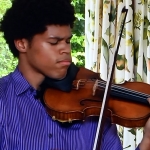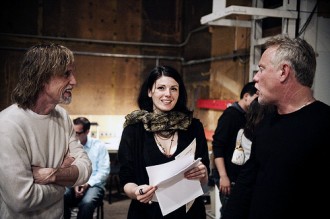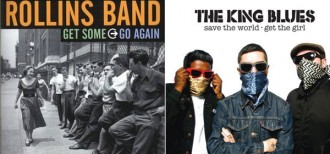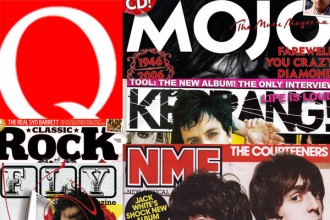Editor’s Blog: 2010
Editor’s Blog: 14 February 2010
It’s Sunday morning and I’m playing catch-up after a night of Winter Olympics. Carina Round is a UK singer/ songwriter who several years ago decamped to the USA to help further her career and already substantial talents. I’ve known Carina for over ten years and it all started with a support slot performance (for Ryan Adams) that blew me away. She’s one of the UK’s finest writers and performers but, with her unwillingness to go along with record label needs for a ‘pop princess’, she has remained ‘underground’ albeit with many local and loyal fans. Carina is one of the most genuine and open artists we’ve met and a few years back she came up to Wrexham specially to record an acoustic set for us. She also guested on our radio show where she was invited to play five of her favourite songs by other artists (Cate Le Bon, take note). Carina’s 2009 E.P., THINGS YOU SHOULD KNOW, topped my list of best E.P.s of 2009 and she is going great guns now in the States culminating in the news that she recorded a song for the movie VALENTINE’S DAY. “Every Time You Smiled” is written by Award-winning composers John Debney and Glen Ballard and performed live with an orchestra. Go Carina!
With the help of the BBC, and the ‘great and not-so-good’ of the music industry, Ellie Goulding we are told is to be the next ‘big thing.’ Now quite what this means I’m not sure - it could be mainstream popularity and/or sales, or even ‘talent.’ Well, there’s other artists out there who I can promise you are more talented who won’t be showered with column inches and the BBC. Last week I received a promo album by a young English lass called Katey Brooks and I reckon she’s the real thing. Katey writes great modern folk songs, possesses a wonderful earthy voice and frankly blew me away. Her new album PROOF OF LIFE is released on 1 March 2010. Check her out and tell your friends, family and lovers: www.myspace.com/kateybrooks & www.kateybrooks.co.uk
Every now and then I come across some precious musical gems. In preparing for tonight’s radio show I’m playing songs from two albums that deserved much more attention and success than they originally received on release. Henry Rollins is probably now best known for his sell-out spoken word concerts but back in 2000 he recorded a heavy rock album that has become one of my favourite rock albums of all-time, and (as is often the case) I found it by accident in a box of CDs that someone no longer wanted. GET SOME, GO AGAIN is no longer available but if you love ‘traditional’ heavy rock seek this one out on Ebay and second-hand shops. It will blow your mind and tonight I’m playing three tracks from it. Rollins summed it up like this back in 2000: “It’s not rocket science. It’s heavy rock music played by people who love love and know how to play hard rock music. In my opinion, judging from what I hear out there these days, it’s becoming a lost art.” The King Blues played Wrexham a few days ago and I mightily impressed, but the set included several songs I had not heard before. I asked JJ to try and source the missing album and low and behold he had it, admitting rather sheepishly that he had never played it… SAVE THE WORLD, GET THE GIRL is simply amazing and still available through Amazon. And yes, I’m playing two tracks tonight, one of which is proving slightly controversial. ‘What If Punk Never Happened’ is the last album track and is a brilliant rap song which sums up what the band is all about. Trouble is there are three F words which I am not allowed to broadcast. The words are completely in context and important for the song but somehow we have to edit them out to be able to play it after 11pm. When so much gratuitous swearing is heard after 9pm on TV and BBC Radio 4 broadcast a John Lennon interview at 9am with F words liberally punctuating John’s answers, I wonder what’s fucking gong on. I say it’s about time that the broacasting authorities grew up and allowed us to do what others are able to do with impunity. To me, editing important songs is like burning books and is nothing short of unjust and juvenile censorship.
This piece of news arrived on my desktop last week:
“Mojo has overtaken Q as the UK’s biggest paid-for music title, according to ABC figures released today. Mojo was one of few music titles to gain readers over the six-month period, from July to December 2009, which the latest ABC figures cover. It grew its circulation 0.8% over the period to 98,484, overtaking fellow Bauer title Q, which lost 5.4% of its readership to 94,811. Both titles are, however, behind Channelfly free title The Fly, which grew its readership 1.1% to 108,906 over the six-month period. Future’s Classic Rock increased its circulation by 1.3% to 71,242. Meanwhile, NME and Kerrang! lost readers in the last six months of 2009, a period in which both titles appointed new editors. Krissi Murison, previously deputy editor at NME and music director for Nylon, took over from Conor McNicholas as NME editor in September. The ABC figures show that the IPC title lost 6.0% of its readers in the last half of 2009, with an average circulation of 38,486. Nichola Browne was appointed editor of Bauer’s Kerrang! in August. It lost 4.9% of its readers in the six-month period, taking its circulation to 41,777. The results were part of a wider trend of falling circulation for music magazines: overall the market sector was down 7% year-on-year.”
The publishing industry must be concerned, along with their advertisers, with this scenario of steady annual sales decline. To me, it’s inevitable as the Internet grows stronger by the day in supplying music information, while digital publishing and IT hardware (e.g. iPad) is coming of age. We realised many years ago that music downloading would grow and, with the right turn-page technology, the print publishing industry would have to make dramatic changes to its traditional business model and format. The challenge for the publishing industry is enormous, while the question of pricing online publication pricing is a tricky one, especially with the industry’s heavy cost structure. Two years ago we dipped our toes in the water with a couple of digital turn-page publications available at no cost to readers, using the best turn-page technology available. The results were encouraging and we’ll shortly launch a co-operative magazine venture for free. There is something to be said for being small, highy flexible/adaptable, debt-free and independent, with one key resultant benefit: ‘everybody wins.’
Page: 1 2 3 4 5 6 7 8 9 10 11 12 13 14 15 16 17 18 19 20 21 22 23 24 25 26 27 28 29 30 31
|
|

|

Maccabees |
LATEST GALLERY IMAGES

Where Israel Goes, Misery Follows 
The Kanneh-Masons |
|
|





